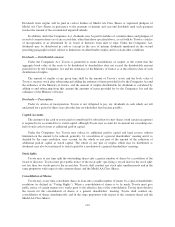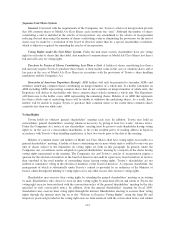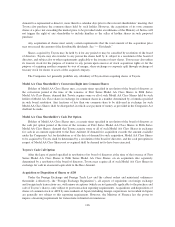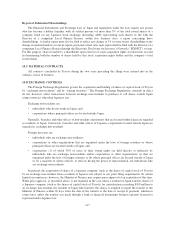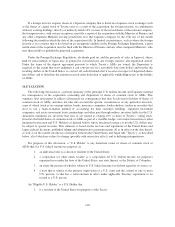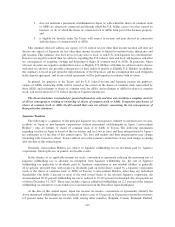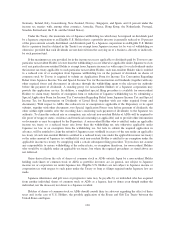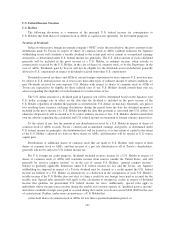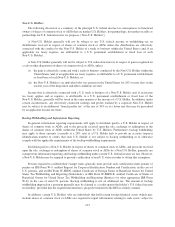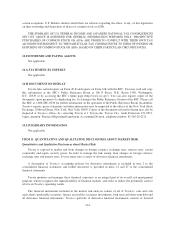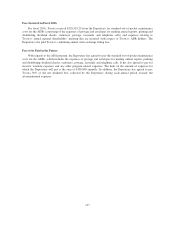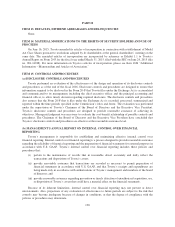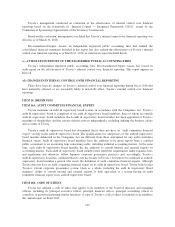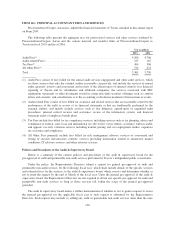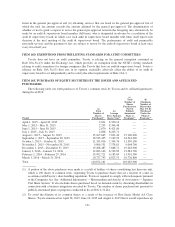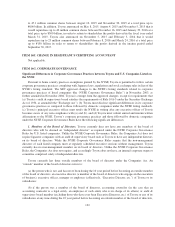Toyota 2015 Annual Report Download - page 127
Download and view the complete annual report
Please find page 127 of the 2015 Toyota annual report below. You can navigate through the pages in the report by either clicking on the pages listed below, or by using the keyword search tool below to find specific information within the annual report.(ii) is obligated to make payments related to Toyota dividends,
will not be allowed a foreign tax credit for Japanese taxes imposed on Toyota dividends.
U.S. Holders are urged to consult their tax advisors regarding the availability of the foreign tax credit under
their particular circumstances.
Taxation of Capital Gains and Losses
In general, upon a sale or other taxable disposition of shares of common stock or ADSs, a U.S. Holder will
recognize gain or loss for U.S. federal income tax purposes in an amount equal to the difference between the
amount realized on the sale or other taxable disposition and the U.S. Holder’s adjusted tax basis in those shares
of common stock or ADSs. A U.S. Holder generally will have an adjusted tax basis in a share of common stock
or an ADS equal to its U.S. dollar cost. Subject to the PFIC rules discussed below, gain or loss recognized on the
sale or other taxable disposition of shares of common stock or ADSs generally will be capital gain or loss and, if
the U.S. Holder’s holding period for those shares or ADSs exceeds one year, will be long-term capital gain or
loss. Non-corporate U.S. Holders, including individuals, currently are eligible for preferential rates of
U.S. federal income tax in respect of long-term capital gains. Under U.S. federal income tax law, the deduction
of capital losses is subject to limitations. Any gain or loss recognized by a U.S. Holder in respect of the sale or
other disposition of shares of common stock or ADSs generally will be treated as U.S.-source income or loss for
U.S. foreign tax credit purposes.
Deposits and withdrawals of common stock in exchange for ADSs will not result in the realization of gain
or loss for U.S. federal income tax purposes.
Passive Foreign Investment Companies
A non-U.S. corporation generally will be classified as a PFIC for U.S. federal income tax purposes in any
taxable year in which, after applying look-through rules, either (1) at least 75% of its gross income is passive
income or (2) on average at least 50% of the gross value of its assets is attributable to assets that produce passive
income or are held for the production of passive income. Passive income for this purpose generally includes
dividends, interest, royalties, rents and gains from commodities and securities transactions. The PFIC
determination is made annually and generally is based on the value of a non-U.S. corporation’s assets (including
goodwill) and composition of its income.
Toyota does not believe that it was a PFIC for U.S. federal income tax purposes for its taxable year ended
March 31, 2016, and currently intends to continue its operations in such a manner that it will not become a PFIC
in the future. Because the PFIC determination is made annually and the application of the PFIC rules to a
corporation such as Toyota (which among other things is engaged in leasing and financing through several
subsidiaries) is not entirely clear, no assurances can be made regarding determination of its PFIC status in the
current or any future taxable year. If Toyota is determined to be a PFIC, U.S. Holders could be subject to
additional U.S. federal income taxes on gain recognized with respect to the shares of common stock or ADSs and
on certain distributions. In addition, an interest charge may apply to the portion of the U.S. federal income tax
liability on such gains or distributions treated under the PFIC rules as having been deferred by the U.S. Holder.
Moreover, dividends that a non-corporate U.S. Holder receives from Toyota will not be eligible for the reduced
U.S. federal income tax rates on dividends described above if Toyota is a PFIC either in the taxable year of the
dividend or the preceding taxable year. If a U.S. Holder owns shares of common stock or ADSs in any taxable
year in which Toyota is a PFIC, such U.S. Holder generally would be required to file Internal Revenue Service
(“IRS”) Form 8621 (or other form specified by the U.S. Department of the Treasury) on an annual basis, subject
to certain exceptions based on the value of PFIC stock held. Toyota will inform U.S. Holders if it believes that it
will be classified as a PFIC in any taxable year.
Prospective investors should consult their own tax advisors regarding the potential application of the PFIC
rules to shares of common stock or ADSs.
122


